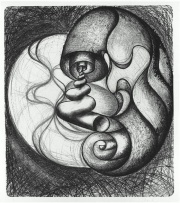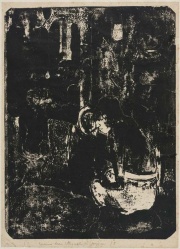Difference between revisions of "Lithograph stone"
(username removed) |
|||
| (6 intermediate revisions by 5 users not shown) | |||
| Line 1: | Line 1: | ||
| − | [[File:2001.703-SC20650.jpg|thumb|]] | + | [[File:1990.499-E8749.jpg|thumb|Lithograph printed from stone; MFA# 1990.499]] |
| + | [[File:2001.703-SC20650.jpg|thumb|Zincograph<br>MFA# 2001.703]] | ||
== Description == | == Description == | ||
| − | When the lithograph printing process was developed in 1796, Aloys Senefelder used a flat stone for the drawing and printing surface. A lithograph stone is usually a fine-grain limestone. Limestone is able to take a high polish but still retain enough porosity to accept the drawing lines. An oily liquid ([ | + | When the lithograph printing process was developed in 1796, Aloys Senefelder used a flat stone for the drawing and printing surface. A lithograph stone is usually a fine-grain limestone. Limestone is able to take a high polish but still retain enough porosity to accept the drawing lines. An oily liquid ([[tusche]]) or a greasy crayon ([[lithograph crayon]]) was used to draw the pattern on the stone. The drawn stone is treated with an etching solution of [[acid]] in [[gum arabic]]. The etch creates distinct greasy and non-greasy regions. Once the etchant is removed, the stone is sponged with water then rolled with an oil-based printing [[lithograph ink|ink]]. The ink is attracted to the drawn, or greasy, areas while the water is retained in the etched areas. Paper is placed over the ink image, then rubbed, scraped, or pressed to transfer the image to the paper. Currently, lithographs are made on metallic sheets of [[zinc]] (zincograph) or [[aluminum]]. |
== Synonyms and Related Terms == | == Synonyms and Related Terms == | ||
| Line 8: | Line 9: | ||
litho stone; lithographic stone; zincograph | litho stone; lithographic stone; zincograph | ||
| − | == | + | ==Resources and Citations== |
| − | * | + | * Thomas Gregory, ''The Condensed Chemical Dictionary'', Reinhold Publishing, New York, 3rd ed., 1942 |
| − | * | + | * Random House, ''Webster's Encyclopedic Unabridged Dictionary of the English Language'', Grammercy Book, New York, 1997 |
* ''The American Heritage Dictionary'' or ''Encarta'', via Microsoft Bookshelf 98, Microsoft Corp., 1998 | * ''The American Heritage Dictionary'' or ''Encarta'', via Microsoft Bookshelf 98, Microsoft Corp., 1998 | ||
Latest revision as of 14:35, 15 October 2022
Description
When the lithograph printing process was developed in 1796, Aloys Senefelder used a flat stone for the drawing and printing surface. A lithograph stone is usually a fine-grain limestone. Limestone is able to take a high polish but still retain enough porosity to accept the drawing lines. An oily liquid (Tusche) or a greasy crayon (Lithograph crayon) was used to draw the pattern on the stone. The drawn stone is treated with an etching solution of Acid in Gum arabic. The etch creates distinct greasy and non-greasy regions. Once the etchant is removed, the stone is sponged with water then rolled with an oil-based printing ink. The ink is attracted to the drawn, or greasy, areas while the water is retained in the etched areas. Paper is placed over the ink image, then rubbed, scraped, or pressed to transfer the image to the paper. Currently, lithographs are made on metallic sheets of Zinc (zincograph) or Aluminum.
Synonyms and Related Terms
litho stone; lithographic stone; zincograph
Resources and Citations
- Thomas Gregory, The Condensed Chemical Dictionary, Reinhold Publishing, New York, 3rd ed., 1942
- Random House, Webster's Encyclopedic Unabridged Dictionary of the English Language, Grammercy Book, New York, 1997
- The American Heritage Dictionary or Encarta, via Microsoft Bookshelf 98, Microsoft Corp., 1998
- The Dictionary of Art, Grove's Dictionaries Inc., New York, 1996 Comment: "Lithography"

